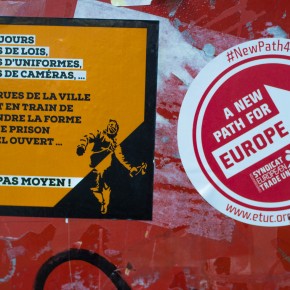Progressive rock was not the sole province of British hippie bands like Yes, and the self-indulgent noodling of ‘virtuoso’ groups such as Emerson Lake and Palmer. It was also identified with artists like Ian Anderson, and his band Jethro Tull, who, while no slouches in the hair department, trafficked in barbed literary diatribes, and dense, oftentimes baroque-sounding instrumental arrangements, dripping with irony.That the band was named after a 19th century agronomist was almost beside the point.
Jethro Tull is no more. Yet, five decades into his career, Anderson’s new solo album, Homo Erraticus sounds more like classic Tull than anything he has recorded since the late 1970s, when the band moved out of its comfort zone, and started experimenting with synthesizers and both folk and more straightforward hard rock. Hearing the disc made me wonder about Anderson’s retirement of the band’s name. Since Jethro Tull’s second album in 1969, the only member of the band aside from Anderson who has been a constant was lead guitarist Martin Barre. Barre has never appeared on an Ian Anderson solo album, so is this the distinction between Tull and Anderson solo, considering that in both incarnations Anderson writes all the music and leads the production?
I put this question to Anderson. “While Martin is certainly the most important and longstanding other band member over the years, the group has always been four, five or six members making up the collective effort,” he told me. “Making some 28 members in all since 1968. My current musicians have all played as members of the ‘Jethro Tull’ band in the last few years and are every bit as accomplished and experienced in the repertoire as any of their peers. But my final years as a musician are better spent, for me, as Ian Anderson rather than under the name of a historical character whose identity we plundered over the years. It is as much for the respect of Mr. Tull the agriculturalist as anything else that I choose to lay the name to rest as the identity of the current and future touring and recording band.”
Perhaps unintentionally, Homo Erraticus demonstrates just how absolute Ian Anderson’s control over Tull really was. While most of the backing musicians on the disc may have played under the Jethro Tull name, none of them was a part of the band during the 1970s period evoked by much of the music on the new disc. Lead guitarist Florian Opahle’s work sounds so similar to Barre on all but one or two tracks, that it leaves the impression that this is the deliberate result of Anderson’s direction.
Homo Erraticus is a full return to the classic Tull sound, after decades of musical experimentation and meandering by the vocalist. He first departed in the late 1970s, with a series of albums focusing keenly on the folk music sound of the British Isles and Western Europe. Jethro Tull then tried their hands at a more electro-pop sound, with mixed results that included Anderson’s first solo effort in 1983 and the album that is certainly the least popular with their fans, 1984’s Under Wraps. Ian Anderson suffered a throat injury shortly thereafter, immediately robbing his voice of much of its richness and range. It has degraded ever since, and the contrast in Anderson’s singing between 2014 and 1974 has never been more keenly felt than on this album. Many of the tracks are crying out for the younger Anderson’s melodious singing. Anderson seems to have tacitly acknowledged this, having brought on a supplemental lead singer, Ryan O’Donnell, on his last album and keeping him around for this one.
1988 saw Tull’s Crest of a Knave win the Grammy award for “Best Heavy Metal Album,” bringing many chuckles to the lips of Jethro Tull devotees, and a good deal of scorn from metalheads, including the band, Metallica, whose …And Justice for All album was the heavy favorite to win the award and, far more “heavy metal.” After a few more hard rock albums, done in somewhat tongue-in-cheek fashion as a response to the Grammy, Tull’s studio catalogue was, for the most part, completed with a pair of albums blending Eastern music with the band’s signature flute-and-guitar mix.
Meanwhile, Ian Anderson was continuing his musical journey in his solo career, meandering through modern classical, New Age, and folk music, before returning to a more rock-oriented sound with 2012’s Thick as a Brick 2, the sequel to Jethro Tull’s hugely successful concept album of 1972. Yet as much as that record harkened back to Tull’s early days, Homo Erraticus is a much fuller return to Jethro Tull’s signature sound.

The first nine tracks of Homo Erraticus are snapshots of British history, from the pre-historic crossing of the ice bridge to the Isles, through the arrival of the Romans, the dominance of Christianity, the rise and fall of the British Empire, the post-war/post-colonial era, up to the present day. One striking feature of these songs is the extent to which Anderson depicts England as being acted upon, rather than being an innovator, in charge of its own history. This is not apologia, but rather Ian Anderson’s attempt to draw a picture of what made the United Kingdom. Not until the last song in the “Chronicles” section of the album, “Pax Britannica” is Britain fully presented as an independent entity, charting its own destiny. Interestingly, until that point, even the historical images are punctuated by repeated reference to contemporary American pop culture.
But those images are not presented, as they so often are, as a sort of American cultural imperialism, but rather a welcome bit of input, helping to give color to what might be an otherwise more bland Britain. There is no implied criticism of the US in the spread of mass culture, but, as Homo Erraticus moves into a grim assessment of contemporary politics, and even a coming apocalypse, Anderson sees the decline of Western civilization as afflicting the entire Western world, not just an ailing UK. Yet, even there, his vision has a hopeful tinge, suggesting the possibility of rebirth, rather than a simple end to history.
Jethro Tull fans won’t be surprised that Anderson has the end of the world on his mind. On top of whatever grim, yet commonplace, assessments of climate change he might have, he has a familial connection to the latest pop culture apocalypse craze: the zombie meme. Anderson’s son-in-law is, after all, Andrew Lincoln, the lead actor in the hit television series, The Walking Dead.
But I was a bit surprised by its appearance on Homo Erraticus. Aside from the explicit mention of The Walking Dead and Lincoln’s “Officer Rick” character in one track, Anderson’s final apocalyptic vision in the last track, “Cold, Dead Reckoning” also calls a similar vision to mind. Yet, when I met Anderson in 2010, just before Lincoln’s wildly successful series began, both he and his wife, Shona expressed their bewilderment at the popular fascination with zombies. So, I asked him if his feeling about this pop culture phenomenon had changed.
“It’s not the zombie thing that appeals to me,” he told me. “Just that, along with much excellent US TV drama writing – True Detective is a recent one – where improbable or utterly fanciful story lines are created to allow for morality tales to be told. And then, there’s Shakespeare….” Indeed, the morality tale is a feature of Homo Erraticus. It’s something Ian Anderson has tried before over the years, with the original Thick as a Brick, 1973’s A Passion Play, and in various tracks on other albums, including the seminal Aqualung among others.

But as entertaining, and sometimes insightful, as some of those journeys of lyrical philosophizing were, the sum total of Homo Erraticus presents a much more mature view of the world. Not only are the lyrics more serious. They show a depth of what one might be tempted to call wisdom, acquired over years of world travel and observation. The added depth is needed, too. The mirth and humor that often punctuated Anderson’s earlier writing is almost completely absent on Homo Erraticus. The album is not always grim; there are many positive images and messages there. But where, on A Passion Play, a young Ian Anderson seemed to feel forced to insert a bit of absurdity in the middle (it didn’t work very well) here he is confident enough to omit that ingredient.
What we’re left with is a fully-realized work, an exposition by one of the elders of prog rock, who is willing to embrace that role as he advances into his sixties. “We live in a world of acute inequalities,” Anderson told me. “Seven billion people on planet Earth seeking their rightful chance to enjoy an equal share of our so-called civilized wealth does not compute in terms of existing resources. Who are we to deny the underdeveloped countries their right? But seven billion air conditioners, family cars, washing machines, freezers and so on will exacerbate climate change even more. Wouldn’t we all rather be living on a planet with 3 billion – not the 9 billion that will be the case in 40 years? Educate girls and give women equal rights in every country, regardless of religion and cultural bigotry. Let them have the educated choice in family size and planning. Make capitalism an ethical ‘religion.’ Benevolent capitalism. Instill personal morality in the hearts and minds of our young. Less greed. Less ….stuff. We can do this the easy way. Or we can do it the hard way.”
Some of us, myself included, might question if “benevolent capitalism” is possible. But the principle he is striving for stands on its own. And, clearly, Homo Erraticus envisions that we are going to do it the hard way. Yet that vision remains one of starting over, a reset that will be apocalyptic, but which will also give humanity a second chance, equipped with experience that would help us do better next time. Ultimately, what comes through most on this LP is the continued relevance of an artist whom critics once considered to be a relic from a bygone age. It’s obvious why Ian Anderson, and his former band, have been able to maintain such a vast and devoted fanbase.
Photographs courtesy of Heinrich Klaffs, Sam Breach, and Studio Grafico EPICS





